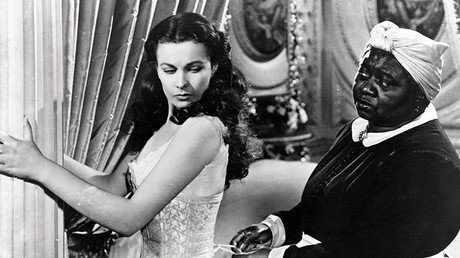'Gone with the Wind' – Latest effort to ‘rewrite American history’ hits Memphis theater
Refusing to show such a historically significant film is an example of trying to rewrite America’s history: it should be shown and talked about and not called insensitive, says writer and comedian Jeffrey Mark Klein.
After targeting monuments commemorating the lives of Confederate leaders, the split in US society is now moving to the world of the big screen.
The Orpheum Theater in Memphis, Tennessee said it would cancel its annual showing of the 1939 classic movie 'Gone with the Wind.' Directed by Victor Fleming, the film about love during the Civil War, which grabbed eight Academy Awards, has been accused of being “racist and insensitive” by some people.
The theater remained rather vague about the number of people who disagreed with the showing of the film, saying only they had “numerous comments” from viewers.
Based on Margaret Mitchell's 1936 novel, the film is set on a Southern plantation during the Civil War and Reconstruction periods.
Canceling the showing after 34 consecutive years of being featured at The Orpheum fired up social media. Some tweets were accompanied with the hashtag #HattieMcDaniel after the actress, who played the house maid Mammy. For her role in the film, McDaniel became the first African American to win an Academy Award.
The film's producer, Daniel O. Selznick, reportedly collaborated closely with the black community to avoid any accusations of racism.
The first movie in which a black actor won an academy award is now racist because 'feelings'.
— Paul Joseph Watson (@PrisonPlanet) August 27, 2017
Let that sink in.https://t.co/DRe1GI0Ybs
RT talked to the writer and comedian Jeffrey Mark Klein who suggest that, from monuments to award-winning movies, the country's left-wing is trying to rewrite American history.
“It is funny that they say it is insensitive only because we are talking about two different time periods for historical context,” Klein told RT. “The movie itself was made in the 1930s, so historically that movie was not only acceptable but very well received in the 30s. And the movie itself takes place in the 1860s".
Klein agreed the film is insensitive is “pretty accurate for the time period in which the movie takes place,” it seems “weird” to hear those same arguments many decades later. There is also the question as to whether the theater management, with the bottom line as its main consideration, succumbed to pressure from a small group of individuals who found the film somehow racist.
It is a sad thing… It is really odd, if you think about it. Over here our artistic community…is fond of pushing the envelope of what is culturally acceptable, what is the norm, trying to break taboos, trying to get people to think differently about life. We are not going to change history. We have in our country this sad legacy and for many decades slavery was lawful in the US. I don’t think we can wish that away. I don’t think we should cover it up. I think we should learn from that mistake. - political analyst and writer Charles Ortel, to RT.
“If they had patrons tell them we don’t want to see ‘Gone with the Wind’ and those patrons voices outweigh the voices of the patrons who want to see ‘Gone with the Wind’, then as a business owner they just need to make whatever decision is going to make them the most money,” he said. “But if they are just giving into a few loud people who are claiming ‘Gone with the Wind’ is bad, I think that is stupid.”
Regarding the historical feat of Hattie McDaniel, who starred as a house servant in the film, being the first black person to win an Oscar, the "movie has very historical significance even just for that fact”
“A lot of the people that claim this movie is insensitive care so much about identity politics, they should be excited about the fact that Hattie McDaniel is an Oscar winner because of this movie. They should want this movie not only shown but talked about all the time. It is almost hypocritical not to show it,” he continued.
There is also the question of the film's place in history, which certainly cannot be denied.
“Gone with the Wind’ is ... a cinematic feat; it progressed film forward both in terms of the art of filmmaking, the art of storytelling and progressiveness".
And indeed if we going to care about slavery in 2017, it still exists in parts of Africa, in parts of the Middle East, maybe in Asia. Instead of doing something so silly as to barring a play, we ought to decide how much of America’s resources and our allies resources might be dedicated finally to wiping slavery out from the face of the Earth once and for all. This is a kind of story that will get airtime and attention in the mainstream media, though I suspect it deserves criticism rather than adulation. - political analyst and writer Charles Ortel
Asked how such a film could find itself on the wrong side of history, so to speak, Klein suggested it is a "reaction" to the recent protests that rocked Charlottesville and Berkley.
This, he said, amounted to an attempt to "rewrite America's history," which he called "wrong."
"I feel like most people recognize the removal of historical statues seems to be an attempt to rewrite America’s history and not showing a historically significant movie would also be an example of trying to rewrite America’s history. I think it is a similar type of reaction, but I think it is the wrong reaction.”
Finally, there remains the possibility that the management of the theater is "afraid that radical left groups like Antifa are going to show up and destroy the theater if they show a movie like ‘Gone with the Wind’ because it may be deemed culturally insensitive, despite the fact that it is very culturally significant…
Radical left groups are known to act very irrationally, especially in the face of logic and accurate American history,” Klein concluded.
The statements, views and opinions expressed in this column are solely those of the author and do not necessarily represent those of RT.













